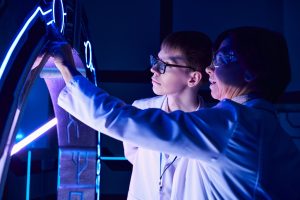In a recent interview with the Financial Times, Christopher Bishop, Director of Microsoft’s AI for Science lab, emphasized the profound impact of artificial intelligence (AI) on scientific research. He identified AI’s ability to expedite complex research processes as its “killer application,” particularly in fields such as chemistry, physics, biology, and climate science.
Accelerating Scientific Research with AI
Bishop highlighted that AI technologies, especially deep learning and large language models (LLMs), have revolutionized the speed and breadth of scientific discovery. These tools can process vast datasets, recognize intricate patterns, and generate hypotheses, thereby reducing the time needed for experimental research. For example, in drug discovery, AI can swiftly navigate extensive molecular databases to identify potential therapeutic compounds, which traditionally requires significant human effort and time.
Microsoft’s Commitment to AI in Science
Under Bishop’s leadership, Microsoft’s AI for Science lab, established in 2022, focuses on integrating AI into natural sciences to confront global challenges. The lab’s mission includes developing AI-driven solutions for critical issues such as climate change, sustainable energy, and advancements in healthcare. Bishop stated, “Scientific discovery is so fundamental to human progress… it’s about gaining a better understanding of the world to improve the human condition.”
Personal Journey from Physics to AI
Reflecting on his career journey, Bishop shared his transition from theoretical physics to artificial intelligence. Initially captivated by neural networks and their potential to emulate brain functions, he recognized AI’s transformative capabilities in modeling complex systems. This realization led him to focus on applying AI to scientific research, with the goal of enhancing understanding and innovation across various domains.
Looking Ahead
Bishop envisions AI playing an increasingly central role in scientific endeavors. He anticipates the development of AI-assisted tools that will further streamline discovery processes, enabling scientists to tackle more sophisticated problems with greater efficiency. Bishop emphasized, “My view is that scientific discovery will prove to be the single most important application of artificial intelligence.”
Christopher Bishop’s insights underscore the pivotal role of AI in transforming scientific research. By accelerating data analysis and hypothesis generation, AI stands to significantly advance our understanding of complex scientific phenomena, paving the way for innovative solutions to some of the world’s most pressing challenges.



